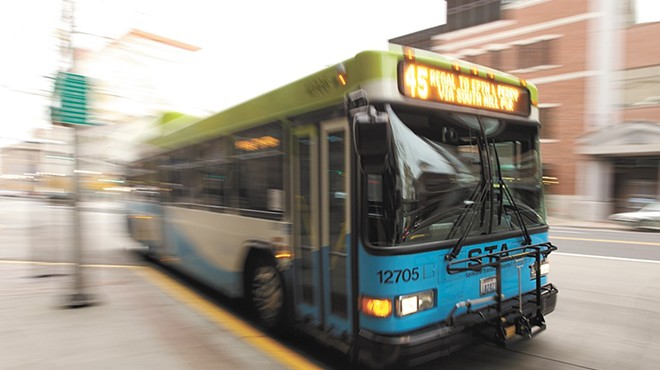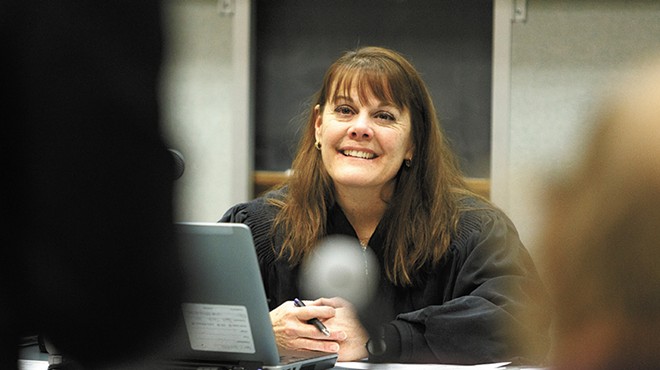Monday, April 25, 2016
Spokane County gets a surge of grant money to improve criminal justice system
Spokane County will see an influx of about $2.3 million in grant money over the next few years to improve its criminal justice system, thanks in part to efforts by the Regional Law and Justice Council.
Here's a quick look at each of the grants:
• A $330,000 grant from the Department of Social and Health Services could be used to hire more mental health professionals in the Spokane County Jail in an effort to address the backlog of people waiting for a mental competency evaluation. By law, DSHS has seven days to complete an evaluation to determine if a person is mentally competent to stand trial, but often that deadline is not met. That means defendants typically languish in jail, where their mental health can deteriorate.
In April 2015, a federal judge ordered DSHS to reduce wait times for evaluation and treatment to come into compliance with state law.
The money is a slice of the funds allocated by Washington state lawmakers for programs to divert people with mental illness and substance abuse issues away from jails and into treatment.
How exactly the money will be spent is still up in the air, according to the criminal justice administrator for the Law and Justice Council, Jacquie van Wormer, who helped work on the grant application. One option is hiring extra mental health professionals in the jail.
• $200,000 from the Justice Department's Bureau of Justice Assistance will be used to bolster Spokane's community court and possibly duplicate the model in other areas of the city.
Community court is held in the downtown library with a focus on resolving "quality of life" crimes. Instead of appearing before a judge in a courtroom, those charged with minor offenses in the city — such as trespassing, public drinking and public urination — can resolve their cases in a more informal setting and are connected with service providers to address underlying issues driving their crimes.
The two-year grant will be used to fund a community court coordinator who will maintain and develop relationships with local service providers, a job formerly delegated to the court's two attorneys. Part of the coordinator's responsibilities will be to look for more grant funding and ways to expand the community court idea to other neighborhoods and for other demographics, says Assistant City Prosecutor Adam Papini, who handles the cases diverted to community court.
"We're treating people, not treating cases," Papini says. "This has brought procedural justice to Spokane. We're addressing people's needs, and it humanizes the individuals coming through the court system."
Part of the money will go toward purchasing a new algorithmic tool that will give the attorneys and Judge Mary Logan, who presides over Spokane's community court, more detailed information about each individual defendant.
"Currently we have input from our participants and we have their criminal history," Logan says. "But the distinction between the old and new tools is that instead of a screener saying 'Based on what you told me your needs are, I recommend this,' the tool removes the subjectivity, and the screener's possible implicit bias."
Spokane is one of 10 cities to receive this funding. Two of the other cities — Olympia and Eugene, Ore. — recently visited Spokane's community court and are reportedly using it as a model.
• A $1.75 million grant from the MacArthur Foundation's Safety and Justice Challenge, will be used to reduce Spokane County's jail population and racial and ethnic disparities within the jail.
Spokane County and the City of Spokane will kick in an additional $1.2 million over the next three years, though exactly how much each side will contribute isn't decided yet.
The current jail population in Spokane County, which includes the Spokane County Jail and Geiger Correction Center, fluctuates between 800 and 950, according to jail Lt. Mike Sparber. The goal is to reduce the population by 17 percent in the first two years, and 21 percent by the third year.
Part of the money will support additional pretrial services, officers and tools, such as electronic home monitoring, to establish a more robust pretrial monitoring program. Some funds will also be dedicated to hiring more mental health professionals in the jail, as well as developing and implementing a racial equity toolkit — a lens through which local policymakers will look in an effort to identify bias and inequality, according to a release from the MacArthur Foundation.
Tags: news , criminal justice , MacArthur Foundation , Spokane County Jail , community court , DSHS , Image























